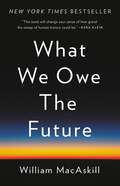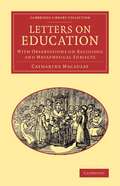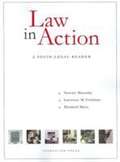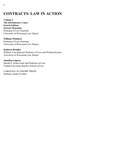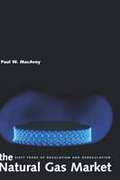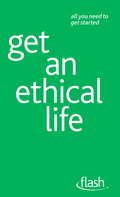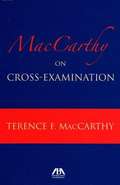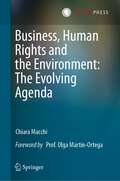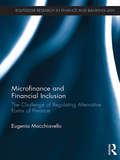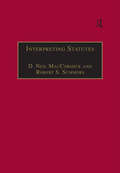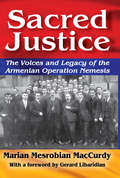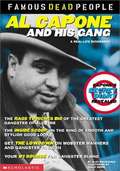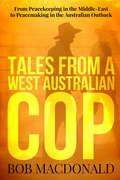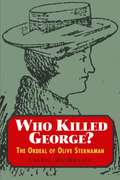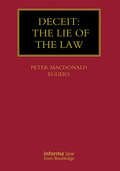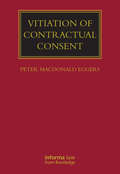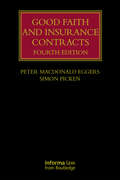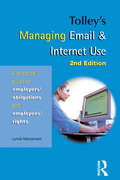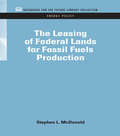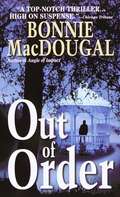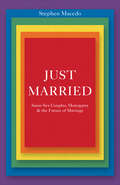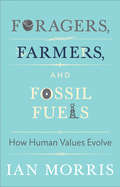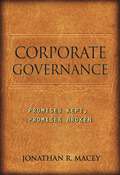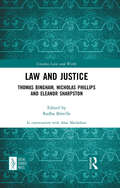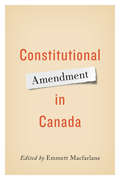- Table View
- List View
What We Owe the Future: The Sunday Times Bestseller
by William MacAskillAn Instant New York Times Bestseller &“This book will change your sense of how grand the sweep of human history could be, where you fit into it, and how much you could do to change it for the better. It's as simple, and as ambitious, as that.&”—Ezra KleinAn Oxford philosopher makes the case for &“longtermism&” — that positively influencing the long-term future is a key moral priority of our time. The fate of the world is in our hands. Humanity&’s written history spans only five thousand years. Our yet-unwritten future could last for millions more — or it could end tomorrow. Astonishing numbers of people could lead lives of great happiness or unimaginable suffering, or never live at all, depending on what we choose to do today. In What We Owe The Future, philosopher William MacAskill argues for longtermism, that idea that positively influencing the distant future is a key moral priority of our time. From this perspective, it&’s not enough to reverse climate change or avert the next pandemic. We must ensure that civilization would rebound if it collapsed; counter the end of moral progress; and prepare for a planet where the smartest beings are digital, not human. If we make wise choices today, our grandchildren&’s grandchildren will thrive, knowing we did everything we could to give them a world full of justice, hope and beauty.
Letters On Education: With Observations On Religious And Metaphysical Subjects (Cambridge Library Collection)
by Catharine MacaulayFirst published in 1790, this collection of letters presents the mature views of Catharine Macaulay (1731-91) on education and related topics. Famed as an impassioned writer on history and politics, she defied eighteenth-century preconceptions of what it was possible and appropriate for women to achieve. Ranging across a broad spectrum of subjects, from diet and reading to pastimes, religion and discipline, this work reflects her enlightened thinking. She compares the educational situation in England to the contemporary French and American systems, and even those of ancient Rome and Sparta. Championing equality in education regardless of gender, Macaulay argues for the instruction of girls within a co-educational system, seeing this as the only way to improve female standing in society. Also reissued in this series is her eight-volume History of England (1763-83), which traces the upheavals of the seventeenth century.
Law In Action: A Socio-Legal Reader
by Stewart Macaulay Lawrence M. Friedman Elizabeth MertzThis text is designed for law students and for courses in legal studies programs. The reader deals in depth with the relationship between the legal system and its surrounding society, including such classic issues as the social sources of law and the impact of legal rules and institutions on society. Other chapters examine the role of judges and lawyers in the system and how culture and historical tradition help mold the legal systems of various societies. The book contains six chapters, each containing classic and contemporary readings on these subjects, with extensive notes and questions to guide the student.
Contracts: Law in Action, Volume 1: The Introductory Course
by Stewart Macaulay William Whitford Kathryn HendleyContracts: Law in Action (CLA) is unique among contracts casebooks for two reasons. First, it has a distinct methodological commitment the ''law in action'' approach pioneered by, among others, authors Macaulay and Whitford. CLA provides unique contextual background into such chestnut cases as Parker v. Twentieth Century Fox and Hoffman v. Red Owl. This context allows teachers to explore such issues as where cases come from and what impact they have on the parties and others. Second, unlike many other casebooks CLA offers detailed and challenging problem sets to help students develop both the basic analytic skills they need to succeed and the larger modes of inquiry that distinguish the best lawyers. CLA is the rare book that marries theory and practice in an engaging and accessible way.
The Natural Gas Market: Sixty Years of Regulation and Deregulation
by Paul W. MacavoySix decades of efforts by federal agencies to regulate the natural gas industry in the U. S. have failed, says the author of this important book. Paul MacAvoy shows that no one has gained from public control of the natural gas industry, and he argues that all participants would gain from complete deregulation. For regulated and about-to-be-regulated industries, the costly history of gas regulation is a tale to heed well.
Get an Ethical Life: Flash
by Peter MacBrideGet an Ethical Life is a short, simple and to-the-point guide to the basic principles behind ethical, sustainable living, in a few short steps. Even if you are completely new to this way of life, in just 96 pages you will discover some essential ideas and strategies that will make a huge difference if you want to live a more sustainable, balanced life - without having to spend months learning how.
MacCarthy On Cross-Examination
by Terence F. MacCarthyLearn how to look good on cross, even when the witness is not cooperating. Learn how to manage and effectively minimize the witness's involvement, without appearing controlling, extracting, and insulting. Filled with illustrative cross examinations from actual cases, this book is your key to employing these proven techniques in your own practice. Using the three themes that run through out the book--looking good, telling a story, and using short statements--you can take control of your cross examinations and achieve the results you desire.
Business, Human Rights and the Environment: The Evolving Agenda
by Chiara MacchiMore than ten years after the adoption of the UN Guiding Principles on Business and Human Rights, this book critically reviews the achievements, limits and next frontiers of business and human rights following the ‘protect, respect, remedy’ trichotomy. The UN Guiding Principles acted as a catalyst for hitherto unprecedented regulatory and judicial developments. The monograph by Macchi proposes a functionalist reading of the state’s duty to regulate the transnational activities of corporations in order to protect human rights and adopts a holistic approach to the corporate responsibility to respect, arguing that environmental and climate due diligence are inherent dimensions of human rights due diligence. In the volume emerging legislations are assessed on mandatory human rights and environmental due diligence, as well as the potential and limitations of a binding international treaty on business and human rights. The book also reviews groundbreaking litigation against transnational corporations, such as Lungowe v. Vedanta or Milieudefensie v. Shell, for their human rights and climate change impacts. The book is primarily targeted at academic and non-academic legal experts, as well as at researchers and students looking at business and human rights issues through the lenses of legal studies (particularly international law and European law), political sciences, business ethics, and management. Additionally, it should also find a readership among practitioners working in the public or private sector (consultants, CSR officers, legal officers, etc.) willing to familiarize themselves with the expanding areas of liability, financial and reputational risks connected to the social and environmental impacts of global supply chains.Chiara Macchi is currently Lecturer in Law at Wageningen University & Research in The Netherlands.
Microfinance and Financial Inclusion: The challenge of regulating alternative forms of finance (Routledge Research in Finance and Banking Law)
by Eugenia MacchiavelloFollowing the recent global financial crisis there is a growing interest in alternative finance – and microfinance in particular – as new instruments for providing financial services in a socially responsible way or as an alternative to traditional banking. Nonetheless, correspondingly there is also a lack of clarity about how to regulate alternative financial methods particularly in light of the financial crisis’ lessons on regulatory failure and shadow banking’s risks. This book considers microfinance from a legal and regulatory perspective. Microfinance is the provision of a wide range of financial services, particularly credit but also remittances, savings, to low-income people or financially excluded people. It combines a business structure with social inspiration, often resorts to technological innovations to lower costs (Fintech: e.g. crowdfunding and mobile banking) and merges with traditional local experiences (e.g. financial cooperatives and Islamic finance), this further complicating the regulatory picture. The book describes some of the unique dimensions of microfinance and the difficulties that this can cause for regulators, through a comparative analysis of selected European Union (EU) countries’ regimes. The focus is in fact on the EU legal framework, with some references to certain developing world experiences where relevant. The book assesses the impact and validity of current financial regulation principles and rules, in light of the most recent developments and trends in financial regulation in the wake of the financial crisis and compares microfinance with traditional banking. The book puts forward policy recommendations for regulators and policy makers to help address the challenges and opportunities offered by microfinance.
Interpreting Statutes: A Comparative Study (Applied Legal Philosophy #23)
by D. Neil MacCormick Robert S. SummersThis book is a work of outstanding importance for scholars of comparative law and jurisprudence and for lawyers engaged in EC law or other international forms of practice. It reviews, compares and analyses the practice of interpretation in nine countries representing Europe as well as the US and Argentina in common and civil law; it also explores implications for general theories of interpretation and of justification. Its authors, who include Aulis Aarnio, Robert Alexy, Ralf Dreier, Enrique Zuleta-Puceiro, Michel Troper, Christophe Grzegorczyk, Jean-Louis Gardes, Enrico Pattaro, Michele Taruffo, Massimo La Torre, Jerry Wroblewski, Alexsander Peczenik, Gunnar Bergholtz and Zenon Bankowski, as well as editors Robert S. Summers and D. Neil MacCormick, constitute an international team of great distinction; they have worked on this project for over seven years.
Sacred Justice: The Voices and Legacy of the Armenian Operation Nemesis (Armenian Studies)
by Marian Mesrobian MacCurdySacred Justice is a cross-genre book that uses narrative, memoir, unpublished letters, and other primary and secondary sources to tell the story of a group of Armenian men who organized Operation Nemesis, a covert operation created to assassinate the Turkish architects of the Armenian Genocide. The leaders of Operation Nemesis took it upon themselves to seek justice for their murdered families, friends, and compatriots. Sacred Justice includes a large collection of previously unpublished letters, found in the upstairs study of the author's grandfather, Aaron Sachaklian, one of the leaders of Nemesis, that show the strategies, personalities, plans, and dedication of Soghomon Tehlirian, who killed Talaat Pasha, a genocide leader; Shahan Natalie, the agent on the ground in Europe; Armen Garo, the center of Operation Nemesis; Aaron Sachaklian, the logistics and finance officer; and others involved with Nemesis. Marian Mesrobian MacCurdy tells a story that has been either hidden by the necessity of silence or ignored in spite of victims' narratives—the story of those who attempted to seek justice for the victims of genocide and the effect this effort had on them and on their families. Ultimately, this volume reveals how the narratives of resistance and trauma can play out in the next generation and how this resistance can promote resilience.
Al Capone and His Gang
by Alan Macdonald Philip ReeveThe hilarious biography reveals the captivating and dramatic life of one of the most notorious mobsters of all time -- his rise to fame, illegal activities, and a surprising personal side.
Tales From a West Australian Cop
by Bob MacdonaldReal life police drama is okay...but true stories of police emergencies that make you laugh out loud--as well as shudder--are better! Experience what it's like to be involved in a high-speed car chase. Learn how to cope with the stress of telling someone of the death of a loved one. What is life like on a remote Australian desert aboriginal community? How do police deal with tribal 'pay-back' spearing incidents? Experience the anguish of working in a war zone...and why controlling your imagination is so crucial, when you find yourself alone facing a deranged man armed with a weapon. Stare death in the face at the hands of drunken or drug crazed people...and live to tell the tale. Laughter helps the mind, heals the body and is a critical survival tool for all who work on the frontline of death, dying and disaster. Take a peek inside this diary of a West Australian Police Officer who knows that it's okay to laugh at yourself and the world around you. A natural storyteller, Bob MacDonald's writing is refreshing and makes easy reading. MacDonald spent thirty years serving as a police officer; working his way through the ranks--from a raw recruit through to a commissioned officer attached to the Internal Investigation Branch of the Professional Standards Portfolio. His duties included time with the United Nations Civilian Police blue beret peacekeepers, based on the island nation of Cyprus during the Greek/Turkish conflict, as well as extensive service in Australian outback locations; Papua New Guinea and North Solomon Islands.
Who Killed George?: The Ordeal of Olive Sternaman
by Cheryl MacdonaldWhen Ezra Chipman brought fellow Canadian George Sternaman to board at his Buffalo home, he set in motion a nightmarish chain of events. Within months, Ezra was dead of a mysterious ailment. Then, shortly after marrying Ezra’s widow Olive, George developed similar symptoms. Impoverished by George’s long illness, the family moved to his mother’s farm in Haldimand County, Ontario. There, in August 1896, 24-year-old George Sternaman died. After his funeral, Olive returned to Buffalo to try to pick up the pieces of her life.Meanwhile, a Canadian investigation into George’s death had begun. Medical examinations and evidence uncovered by Ontario’s "great detective," John Wilson Murray, pointed to one conclusion: George Sternaman had died of arsenic poisoning. Olive was arrested and charged with his murder.Sensational legal battles followed, involving the highest courts in both Canada and the United States. When Olive finally went to trial at the Haldimand County Courthouse in Cayuga, her lawyer, Welland politician William Manley German, was up against the most brilliant legal mind of the day: Britton Bath Osler. Drawing on newspaper accounts and legal documents, Cheryl MacDonald has recreated a true-to-life Victorian melodrama. Who Killed George? offers insight into the legal system, social sentiments, and status of women of the 1890s, along with the thrill of a genuine Canadian murder mystery.
Deceit: The Lie of the Law (Lloyd's Commercial Law Library)
by Peter Macdonald EggersDeceit: The Lie of the Law will provide a complete and detailed account of the law of deceit as developed over the past two centuries. This new book by Peter MacDonald Eggers examines the commercial, contractual and civil relationships in which claims in deceit have been made.
Vitiation of Contractual Consent (Lloyd's Commercial Law Library)
by Peter MacDonald EggersThe validity of a contract can be undermined by factors affecting contractual consent. Issues of contractual validity frequently arise for consideration in all types of litigation, not least commercial disputes. This book provides practitioners and academics with an invaluable reference tool, which will enable them to navigate the complex issues of vitiation of contract. When contractual disputes arise, there are a variety of vitiating factors which may be relied on to undermine a contract’s validity. This book provides a comprehensive examination of all the factors vitiating contractual consent from fraud, misrepresentation, non-disclosure, and mistake, to duress, undue influence, unconscionable bargains, and includes chapters on incapacity and unfairness. Each chapter gives a thorough account of the law on each of these vitiating factors, together with an overview of the remedies available. The book’s introduction considers the theoretical foundations of the law in this area. The book will be an invaluable reference tool for lawyers involved in all types of contractual disputes. It will also be a useful reference for academics and postgraduate students of commercial law.
Good Faith and Insurance Contracts (Lloyd's Insurance Law Library)
by Peter MacDonald Eggers Simon PickenGood Faith and Insurance Contracts sets out an exhaustive analysis of the law concerning the duty of utmost good faith, as applied to insurance contracts. Now in its fourth edition, it has been updated to address the arrival of the Insurance Act 2015, as well as any references to new case law. In addition, it synthesises all known judicial decisions by the English Courts concerning good faith in this area. This book is still the only text devoted to a discussion of the duty of utmost good faith applicable to insurance contracts. As good faith is an issue which arises in respect of all insurance contracts, it is a book which will be extremely useful to lawyers involved in insurance as well as insurance practitioners.
Tolley's Managing Email & Internet Use
by Lynda MacdonaldEmail and Internet use is increasingly topical as employers and employees test the boundaries of acceptable use of new communications technology in the workplace. The potential legal liabilities make this a crucial decision-making area for all involved in human resources management.Tolley’s Managing Email and Internet Use will provide you with the essential legal guidance and practical advice to establish, implement and enforce a policy for internet and Email use in your workplace. Tolley’s Managing Email and Internet Use analyses and interprets (in plain language) the law on monitoring employees’ Email and internet activity, the use of confidentiality notices, privacy, harassment and Email interception by employers. It also provides information on the key regulations and guidelines which affect Email and internet policy, including the Human Rights Act 1998, Data Protection Act 1998 and the Regulation of Investigatory Powers Act 2000.Tolley’s Managing Email and Internet Use is the only practical guide to offer you:- strategic guidance on implementing, policing and maintaining an effective Email and internet policy- Current thinking on managing Email and internet use- Sample policies, disclaimers, rules and procedures to assist in establishing your own guidelines- A practical approach featuring questions and answers, checklists and case studies - An accessible read regardless of previous legal experience- Latest case law from recent cases involving Email and internet policyTolley’s Managing Email and Internet Use is a complete reference source for Email and internet policy in the workplace.
The Leasing of Federal Lands for Fossil Fuels Production (RFF Energy Policy Set)
by Stephen MacdonaldStephen McDonald offers a basic understanding of the goals and practices by which the federal government leases its fossil fuel resources and how these practices affect the economy. Originally published in 1979
Out of Order
by Bonnie MacdougalOn the night of a lavish party celebrating newlyweds Doug and Campbell Smith, tragedy strikes when the thirteen-year-old son of an influential senator is kidnapped. The senator--Doug's mentor--urges Cam to track the boy down. It is an offer she cannot refuse, despite her own unsettling suspicion that the statesman seems less concerned about his child than about keeping the scandal out of the headlines. But as Cam soon discovers, everyone has something to hide. With a circle of wealth and ambition closing in tightly around her, Cam penetrates layer upon layer of lies and invention. For the abduction is not what it seems. After using all her investigative skills to find the missing boy, she begins to uncover the shocking story that links him to his captor. Surprised at her deepening attachment to them both, struggling between her duty and what is best for the child, Cam starts to question her loyalties, her marriage, her priorities, even the man she thought she loved. As she pieces together an intricate pattern of abuse and cover-up; as a series of brutal murders looms ever closer, Cam is forced to make the most agonizing decision of her life--to reveal the devastating secret of her own past ... and the shattering lie she has lived for years.
Just Married
by Stephen MacedoThe institution of marriage stands at a critical juncture. As gay marriage equality gains acceptance in law and public opinion, questions abound regarding marriage's future. Will same-sex marriage lead to more radical marriage reform? Should it? Antonin Scalia and many others on the right warn of a slippery slope from same-sex marriage toward polygamy, adult incest, and the dissolution of marriage as we know it. Equally, many academics, activists, and intellectuals on the left contend that there is no place for monogamous marriage as a special status defined by law. Just Married demonstrates that both sides are wrong: the same principles of democratic justice that demand marriage equality for same-sex couples also lend support to monogamous marriage.Stephen Macedo displays the groundlessness of arguments against same-sex marriage and defends marriage as a public institution against those who would eliminate its special status or supplant it with private arrangements. Arguing that monogamy reflects and cultivates our most basic democratic values, Macedo opposes the legal recognition of polygamy, but agrees with progressives that public policies should do more to support nontraditional caring and caregiving relationships. Throughout, Macedo explores the meaning of contemporary marriage and the reasons for its fragility and its enduring significance. His defense of reformed marriage against slippery slope alarmists on the right, and radical critics of marriage on the left, vindicates the justice and common sense of the emerging consensus. Casting new light on today's debates over the future of marriage, Just Married lays the groundwork for a stronger institution.
Foragers, Farmers, and Fossil Fuels: How Human Values Evolve
by Stephen Macedo Christine M. Korsgaard Jonathan D. Spence Margaret Atwood Richard Seaford Ian MorrisMost people in the world today think democracy and gender equality are good, and that violence and wealth inequality are bad. But most people who lived during the 10,000 years before the nineteenth century thought just the opposite. Drawing on archaeology, anthropology, biology, and history, Ian Morris, author of the best-selling Why the West Rules--for Now, explains why. The result is a compelling new argument about the evolution of human values, one that has far-reaching implications for how we understand the past--and for what might happen next.Fundamental long-term changes in values, Morris argues, are driven by the most basic force of all: energy. Humans have found three main ways to get the energy they need--from foraging, farming, and fossil fuels. Each energy source sets strict limits on what kinds of societies can succeed, and each kind of society rewards specific values. In tiny forager bands, people who value equality but are ready to settle problems violently do better than those who aren't; in large farming societies, people who value hierarchy and are less willing to use violence do best; and in huge fossil-fuel societies, the pendulum has swung back toward equality but even further away from violence.But if our fossil-fuel world favors democratic, open societies, the ongoing revolution in energy capture means that our most cherished values are very likely to turn out--at some point fairly soon--not to be useful any more.Originating as the Tanner Lectures delivered at Princeton University, the book includes challenging responses by novelist Margaret Atwood, philosopher Christine Korsgaard, classicist Richard Seaford, and historian of China Jonathan Spence.
Corporate Governance: Promises Kept, Promises Broken
by Jonathan R. MaceyEven in the wake of the biggest financial crash of the postwar era, the United States continues to rely on Securities and Exchange Commission oversight and the Sarbanes-Oxley Act, which set tougher rules for boards, management, and public accounting firms to protect the interests of shareholders. Such reliance is badly misplaced. In Corporate Governance, Jonathan Macey argues that less government regulation--not more--is what's needed to ensure that managers of public companies keep their promises to investors. Macey tells how heightened government oversight has put a stranglehold on what is the best protection against malfeasance by self-serving management: the market itself. Corporate governance, he shows, is about keeping promises to shareholders; failure to do so results in diminished investor confidence, which leads to capital flight and other dire economic consequences. Macey explains the relationship between corporate governance and the various market and nonmarket institutions and mechanisms used to control public corporations; he discusses how nonmarket corporate governance devices such as boards and whistle-blowers are highly susceptible to being co-opted by management and are generally guided more by self-interest and personal greed than by investor interests. In contrast, market-driven mechanisms such as trading and takeovers represent more reliable solutions to the problem of corporate governance. Inefficient regulations are increasingly hampering these important and truly effective corporate controls. Macey examines a variety of possible means of corporate governance, including shareholder voting, hedge funds, and private equity funds. Corporate Governance reveals why the market is the best guardian of shareholder interests.
Law and Justice: Thomas Bingham, Nicholas Phillips and Eleanor Sharpston (Creative Lives and Works)
by Alan MacfarlaneLaw and Justice: Thomas Bingham, Nicholas Phillips and Eleanor Sharpston is the first time a collection of interviews is being published as a book. These interviews have been conducted by one of England’s leading social anthropologists and historians, Professor Alan Macfarlane. Filmed over a period of several years, the three conversations in this volume are part of the series Creative Lives and Works. These transcriptions also form part of a larger set of interviews that cut across various disciplines, from the social sciences, the sciences and the performing and visual arts. The current volume is on three of Britain’s foremost lawyers and judges. Law and justice are an intrinsic part of any civilization, ancient or modern. English law traces its origins to medieval times, at times drawing on ancient legal systems prevalent in Roman and Anglo-Saxon laws. This tradition has had a huge influence across the world through export to the United States and throughout the nations of the former British Empire. The three conversations in this volume further reflect how interconnected the disciplines of history and law are. Thomas Bingham, Nicholas Phillips and Eleanor Sharpston give a wide sketch of the legal system through their own experiences and interpretations. They show how one of the single most important and unique features of British civilization works. The book will be of enormous value not just to those interested in the subject of Law and Justice but also History and Culture Studies as well as those with an interest in Legal Literature. Please note: This title is co-published with Social Science Press, New Delhi. Taylor & Francis does not sell or distribute the Hardback in India, Pakistan, Nepal, Bhutan, Bangladesh and Sri Lanka.
Constitutional Amendment in Canada
by Emmett MacfarlaneIn Canada, the 1982 Constitution Act contains the amending formula, which outlines a set of procedures required to make changes to the constitution. Recent debates over Senate reform, the status of the Supreme Court of Canada, and the rules governing royal succession have highlighted how important the amending formula is in maintaining the vitality and relevance of the governing system. Constitutional Amendment in Canada is the first volume to focus solely on the implications of the amending formula in Canada. Emmett Macfarlane has brought together a group of expert authors to address such topics as the difficulties of constitutional reform, the intersection of various levels of government and the judiciary, and the ability of the public to veto proposed changes. Filling a serious gap in the literature, Constitutional Amendment in Canada is an authoritative study of the historical and contemporary implications of the amending formula.
